Stories > When Anecdotes Become Antidotes
When Anecdotes Become Antidotes
Two recipients of the Singapore International Foundation’s Arts for Good Fellowship are on a mission to create a healing environment for sexual abuse survivors by presenting their stories to the world through an artistic medium.
BY Alywin Chew
he arts have always had the ability to bring humans together. During ancient times, people would gather to listen to troubadours recite poetry and regale at the captivating stories and songs of bards. When the first public museums in the world were built in Rome during the Renaissance, art again brought the masses together.
Today, organisations all over the world have continued to carry on this tradition.
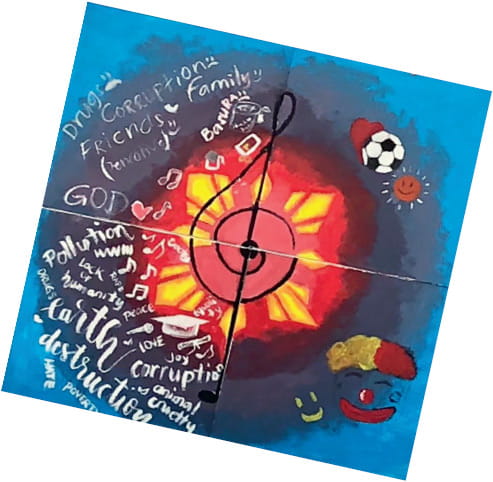 For instance, an initiative by the United Nations Sustainable Solutions Network – Arts Twenty Thirty – aims to forge new perspectives and create solutions to global challenges by drawing upon the power of various art forms. It provides an online platform for artists around the world to interact with one another while showcasing their works themed around sustainable development. To champion the message of sustainability, the organisation also hosts a variety of arts events at political, cultural and scientific forums.
For instance, an initiative by the United Nations Sustainable Solutions Network – Arts Twenty Thirty – aims to forge new perspectives and create solutions to global challenges by drawing upon the power of various art forms. It provides an online platform for artists around the world to interact with one another while showcasing their works themed around sustainable development. To champion the message of sustainability, the organisation also hosts a variety of arts events at political, cultural and scientific forums.
In Singapore, community organisation Artsolute has worked with puppet artists in Southeast Asia to help with the development of regional identity. It has also partnered organisations such as Yong-en Care Centre and Khoo Teck Puat Hospital to forge stronger ties between dementia patients and their families through art.
The Singapore International Foundation (SIF), too, has been a proponent of such endeavours, having launched its Arts for Good Fellowship in 2017. Comprising webinars and exchange programmes in two cities – one of which is Singapore – each year, it offers artists, art administrators and programmers from the social sector around the world a chance to meet, collaborate and harness the power of the arts for positive social change.
“We Would Like The Survivors To Own Their Creative Experience. Speaking Out, Giving Voice To The Pain And Owning It Is Helpful In The Healing Process. Writing It Down, And Seeing Words In Black And White On Paper, Also Helps.”
Amos Manlangit, Special Education Practitioner And SIF’s Arts for Good Fellow, 2018
REBUILDING LIVES WITH ART
Indeed, an ongoing book project by Singporean Eirliani Abdul Rahman and Filipino Amos Manlangit, both of whom were part of the 2018 cohort of the Arts for Good Fellowship, has illustrated how art can also be used to heal wounds that cannot be seen (apart from fostering tighter bonds among individuals). This project is aimed at helping victims of sexual abuse in the Philippines heal through the art of storytelling.
“Child sexual abuse is not often openly talked about in our society. It is taboo. I wanted to break the silence and to dispel the myths surrounding it,” says Eirliani, the executive director of YAKIN (Youth, Adult Survivors & Kin In Need), an organisation in Singapore that helps child victims and adult survivors of sexual abuse.
“Through the ages, storytelling has been an effective medium to tell the truth, and to do so in a way that is more palatable than via more abstract ideas or rhetoric.”
After meeting Eirliani during the Fellowship and learning of her reputation as a champion of sexual abuse victims, Manlangit wasted no time in forging a partnership. He notes that the problem of sexual abuse is one that is prevalent in many countries and cultures, and is currently a pressing issue in the Philippines.
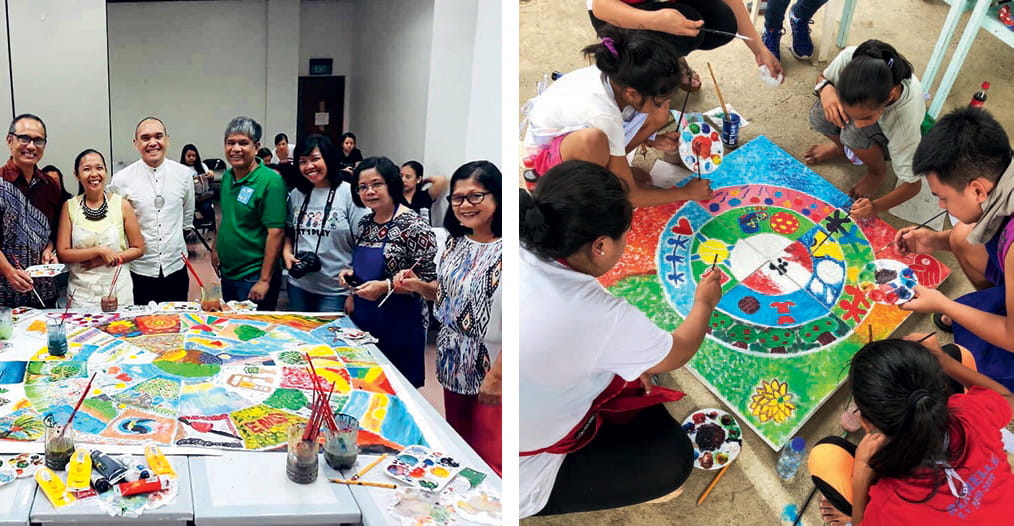
Amos Manlangit works with volunteer arts practitioners to help child victims of sexual abuse in the Philippines overcome their trauma through artistic expression; the mandala art workshops offer a cathartic experience for the participants.
STORIES OF SURVIVAL
Manlangit, who works as a special education practitioner and is also a faculty member of the University of the Philippines College of Fine Arts, says that he and Eirliani will be working with the sexual assault centre in Quezon City as well as at the Office of the City Mayor to determine the number of victims who would like to participate in the project.
“We would like the survivors to own their creative experience. It could take the form of poetry, lyrics, writing journals or even drawing. We could also conduct traditional interviews with the survivors and have their answers written down and preapproved before submitting them to the publisher,” he says.
“An Ongoing Book Project By Eirliani Abdul Rahman And Amos Manlangit, Both Of Whom Were Part Of The 2018 Cohort Of The Fellowship, Has Illustrated How Art Can Also Be Used To Heal Wounds That Cannot Be Seen.”
“Storytelling is an old and valued experience. We all can learn from each other’s life narratives. We will ask about their abuse as children. Speaking out, giving voice to the pain and owning it is helpful in the healing process. Writing it down, and seeing words in black and white on paper, also helps.”
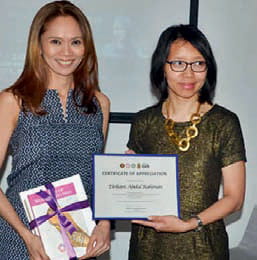
Eirliani (right) believes in harnessing the power of creative disciplines to discuss social issues.
For Eirliani, treading into this territory isn’t new. A former career diplomat, she has been collaborating for the last five years with 2014 Nobel Peace Prize recipient Kailash Satyarthi’s eponymous children’s foundation, whose objective is to prevent sexual abuse and violence against children. She has already co-authored a book on the topic, which was launched in 2017. Currently, she is in the process of writing another book, in collaboration with Manlangit, that tells stories of sexual assault survivors in the Philippines, a derivative of the SIF’s Arts for Good Fellowship.
But it’s not just those they aim to help who have benefitted from the Fellowship. Eirliani and Manlangit say that they, too, have been empowered by the initiative.
NURTURING FRESH IDEAS
Eirliani points out that she has enjoyed learning from fellow arts practitioners about their methods. The interactions with them have also inspired her to continue what she has been doing all these years.
Cross-cultural takeaways, Manlangit (below) says, are also part and parcel of such initiatives. For instance, he has learnt that rejection is not necessarily, as it is usually regarded in Filipino culture, offensive. “Filipinos, most of the time, perceive an act of declining as discourtesy.
In the Fellowship, I learnt that sometimes saying no can help you focus on things that matter or choose what you want to prioritise,” he says.
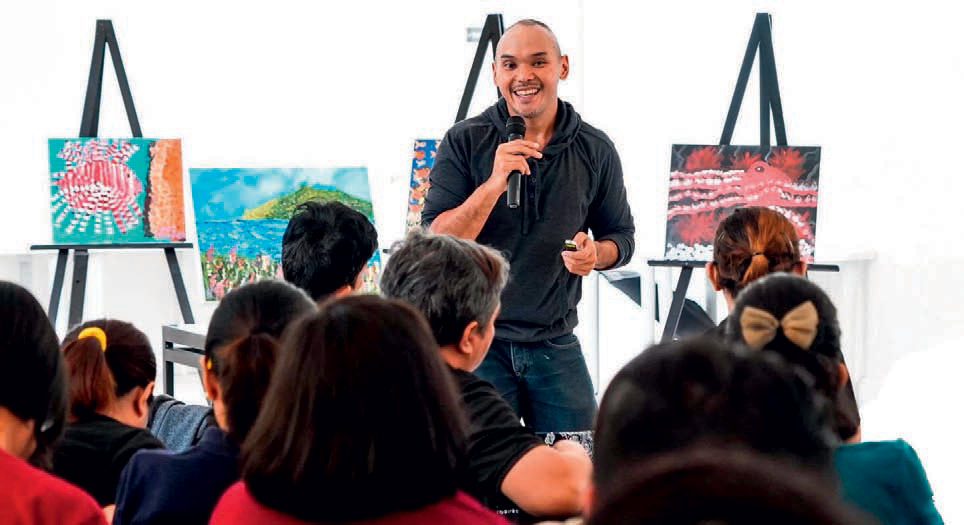
Apart from helping those who need it, the cross-cultural exchange has been an educational experience for both Eirliani and Manlangit.
“Also, in our unstructured conversations during the Fellowship, we introduced each other’s countries, and it was fascinating to hear others’ thoughts about their own political cultures and social make-up. I learnt that expressing love for one’s country can mean different things to different people.
While some express strong criticism against their own governments, others prefer to speak constructively of theirs.”
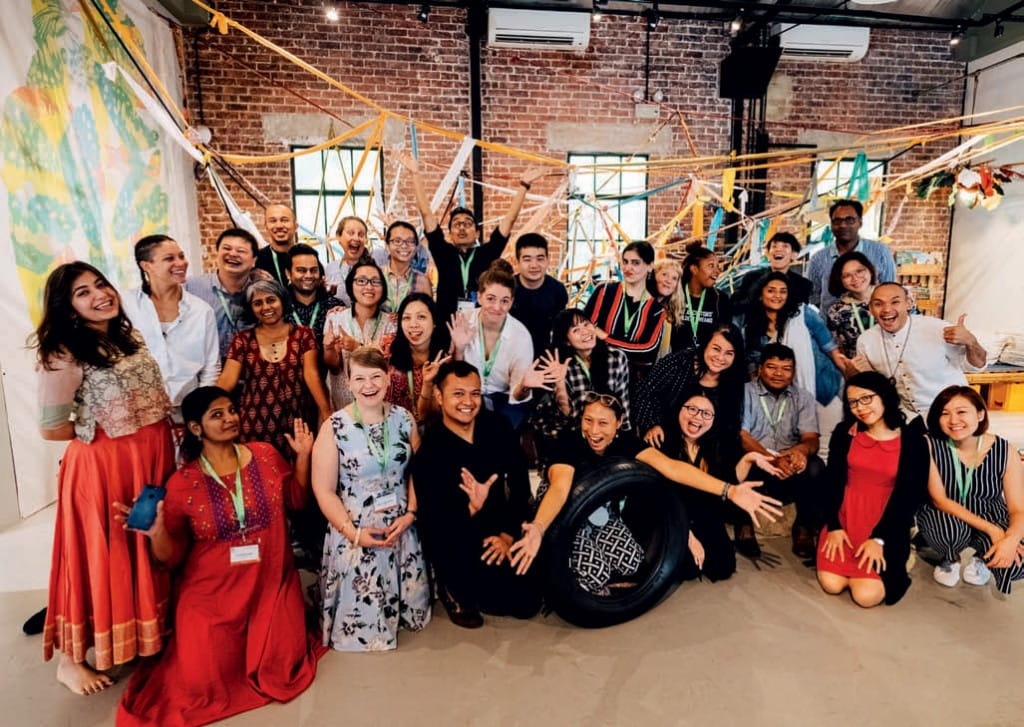
Both artistes voiced their unanimous support for initiatives such as the Arts for Good Fellowship, with Manlangit citing how the arts can help to foster greater inclusivity in society, by highlighting individual differences while still allowing everyone to express themselves in a safe, positive space. “I discovered how flexible thinking, listening, removing personal bias or judgment, and connecting one’s thoughts without competing with the other’s ideas can become a healthy and grounding experience. This is an important component in forming shared visions, cooperating and collaborating,” he says.
“In A World Where Extreme Ideologies Have Gained Traction, It Is Important To Learn How To Speak Outside Our Respective Bell Jars Of Ideas. We Need To Reach Out Across Cultural, Political And Ideological Divides To Find Commonalities To Do Good. The Fellowship Allows Us To Do Just That.”
Eirliani Abdul Rahman, Executive Director, YAKIN And SIF’s Arts For Good Fellow, 2018
Eirliani shares the same sentiment. “In a world where extreme ideologies have gained traction, it is important to learn how to speak outside our respective bell jars of ideas,” she says.
“We need to reach out across cultural, political and ideological divides to find commonalities to do good. The Fellowship allows us to do just that.”
